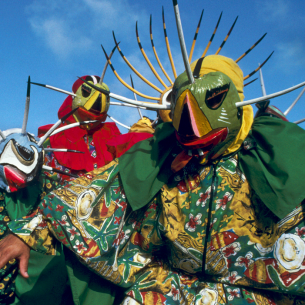By Catalina Maria Johnson
Every July in the town of Loíza, Puerto Rico, Carnival is celebrated with parades and processions that feature enormous masked characters called vejigantes and the music of bomba and plena, in cultural testimony to the African as well as the European and indigenous Taíno heritage of the island of enchantment.
Loíza comes Chicago on Sunday at 2:00 with a multi-faceted performance of song and dance presented at the Harris Theater in collaboration with the Puerto Rican Arts Alliance (PRAA) and AfriCaribe, Chicago’s premiere bomba and plena music and dance ensembles.
The performance follows a 2012 exhibit of costumes and masks organized by the PRAA of the vejigantes, the main characters of the celebration which peaks on July 25 in a feast honoring St. James the Apostle. Tito Rodriguez, Director of AfriCaribe, explains that the vejigantes are folkloric figures whose origins can be traced back to medieval Spain when rebellious Moors were defeated in battle by Saint James and as tribute to the heroic Saint, people began dressing as several characters including mischievous demons.
Along with the costumes and masks, the celebrations incorporate percussion and vocals-based bomba and plena music, both forms that carry uniquely rich histories, which Rodriguez describes; “Plena is more contemporary, it originated beginning of 1900’s and it’s more urban. Bomba is 300 years in the making, older than plena.” He also notes these cultural traditions all took firm root in Loíza as the town has the highest percentage of Puerto Ricans who are of African descent.
Rodríguez also described the famous parades with vejigantes, “The people of the town become characters, bands of vejigantes parade in the street, and people chant and make music and are active participants”. However, the masked figures had another more rebellious cultural motivation, says Rodriguez, in times of slavery: “Vejigantes represent the ugliness of life and the slave masters were not too easy on the slaves, so they were like descriptions of the hardship of life that the Spanish had imposed”. It was also a way, he notes, to express what was forbidden, disguise rebellion or discontent and “ do trickeries and no one found out who did them”
As part of the Loíza in Chicago celebration, there are several special invited guests. Artists who are master mask makers such as Raul Ayala will participate to demonstrate how the masks were made and the history behind the costumes. Additionally, as part of the musical traditions of bomba around the island, and setting the mood, master musicians in the bomba genre such as Marcos Peñaloza PIca will share the stage along with AfriCaribe. “It’s going to be a lively event”, says Rodríguez, “…and there just might be some vejigantes!”

